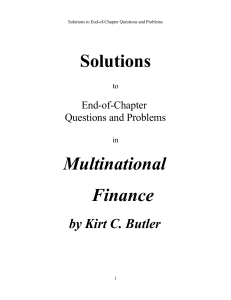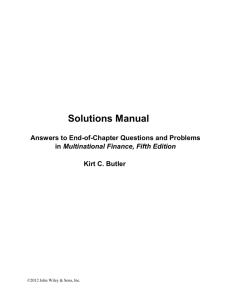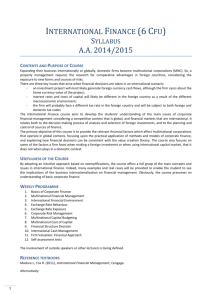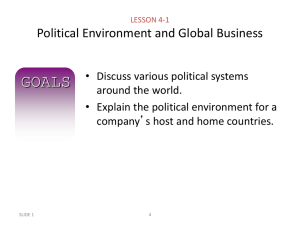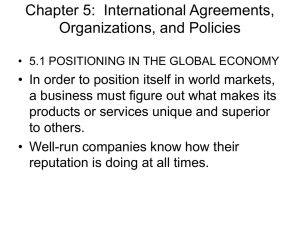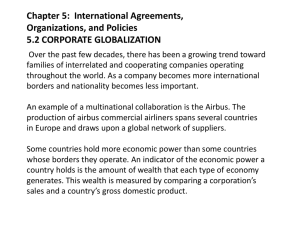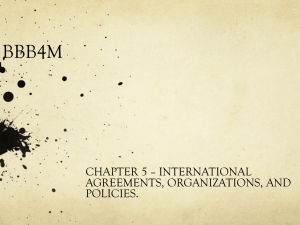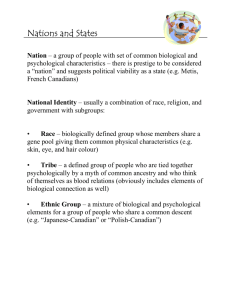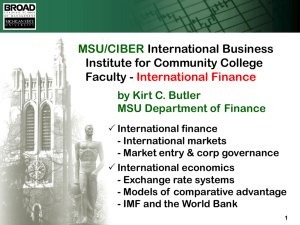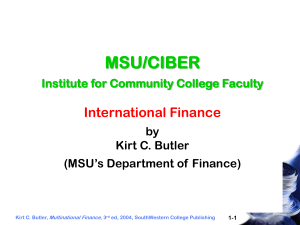sample file
advertisement
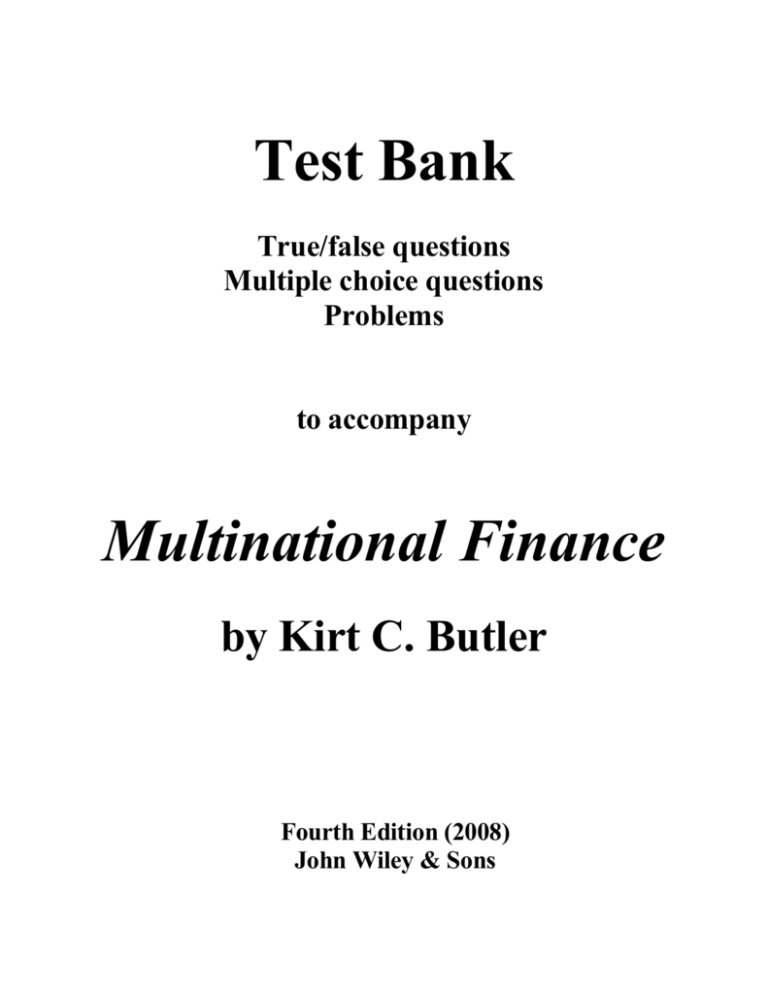
Test Bank True/false questions Multiple choice questions Problems to accompany Multinational Finance by Kirt C. Butler Fourth Edition (2008) John Wiley & Sons Kirt C. Butler, Test Bank for Multinational Finance, John Wiley & Sons, 4th edition PART I The International Financial Environment Chapter 1 An Introduction to Multinational Finance True/False 1. MNCs have investment or financial operations in more than one country. True. 2. The terms “stakeholder” and “shareholder” are synonymous. False. Stakeholders include all those with a stake in the firm. A broad definition of stakeholders includes the firm’s equity shareholders, as well as creditors, customers, suppliers, and employees. 3. The MNC faces greater constraints than the domestic corporation in the timing and location of its investments. False. Multinationals typically have more flexibility in timing and location of their investments, as well as in their operation. 4. Risk exists whenever actual outcomes can differ from expected outcomes. True. 5. Assets and liabilities are exposed to currency risk when their values can change with unexpected changes in currency values. True. 6. “Currency risk” and “currency risk exposure” refer to the same thing – the possibility that currency values will differ from their expectations. False. A firm has a currency risk exposure when its assets or liabilities can change in value with unexpected changes in currency values. 7. Political risk is the risk that the business environment in a host country will change unexpectedly due to political events. True. 8. The investment opportunity set is the set of investments available to the corporation; that is, the set from which the company must select. True. 9. The three types of market efficiency used in the text to describe the performance of financial markets are allocational efficiency, operational efficiency, and transactional efficiency. False. Three types of market efficiency are allocational, operational, and informational efficiency. 10. Economies of scale arise as fixed development or production costs are spread over a larger output. True. 11. Economies of scope are efficiencies that arise across product lines, such as when joint production results in lower per-unit costs. True. 12. Economies of scale are efficiencies that arise across product lines, such as when joint production results in lower per-unit costs. False. These are economies of scope. Economies of scale arise when size itself results in lower average or per-unit production costs. 13. An informationally efficient market is one with abundant information. False. It is a market in which prices fully reflect available information. 14. Allocational efficiency refers to how efficiently a market channels capital toward its most productive 2 Kirt C. Butler, Test Bank for Multinational Finance, John Wiley & Sons, 4th edition uses. True. 3 Kirt C. Butler, Test Bank for Multinational Finance, John Wiley & Sons, 4th edition 15. Allocational efficiency refers to whether a market allocates capital to those investments deemed most worthy by a host government. False. Allocational efficiency refers to how efficiently a market channels capital toward its most productive uses in an economic, rather than a political, sense. 16. Operational efficiency refers to how large an influence transactions costs and other market frictions have on the operation of a market. True. 17. Because of globalization in the world’s markets, a multinational financial manager is more likely than a domestic financial manager to be highly specialized in finance to the exclusion of other fields of business. False. The multinational financial manager must be well versed in each of the business disciplines in which the MNC is involved. 18. The domestic financial manager must be knowledgeable in several areas within finance, whereas the multinational financial manager usually specializes in a single area, such as corporate finance, investments, or financial markets. False. The multinational financial manager is likely to require knowledge of several fields within finance. Multiple Choice 1. * 2. * 3. * 4. * 5. 4 Corporate stakeholders include each of a.-d. except ____. a. creditors b. customers c. managers d. shareholders e. Each of the above is a stakeholder in the firm Loss in value from conflicts of interest between managers and other stakeholders are called ______. a. adverse selection costs b. agency costs c. costs of financial distress d. sunk costs e. transactions costs National and cultural differences manifest themselves in each of the following ways except ______. a. accounting conventions b. distribution c. human nature d. personnel management e. tax systems Opportunities for the MNC to enhance revenues include each of the following except ______. a. advantages of scale b. advantages of scope c. economies of vertical integration d. global branding e. marketing flexibility Opportunities for the MNC to reduce operating expenses include each of the following except ______. a. economies of scale b. economies of scope c. flexibility in global site selection Kirt C. Butler, Test Bank for Multinational Finance, John Wiley & Sons, 4th edition * d. global branding e. low-cost labor 5 Kirt C. Butler, Test Bank for Multinational Finance, John Wiley & Sons, 4th edition 6. * Multinational business strategies for preserving or enhancing operating cash flows through multinational operations include each of the following except ______. a. follow the customer b. follow the leader c. go local d. lead the customer e. the perfect market assumptions 7. * The perfect market assumptions include each of the following except ______. a. efficient markets b. equal access to costless information c. equal access to market prices d. frictionless markets e. rational investors 8. Markets in which prices reflect value are said to be ______. a. allocationally efficient b. free of agency conflicts c. informationally efficient d. operationally efficient e. prone to arbitrage * 9. * 6 Opportunities for MNCs to create value through their financial policies include each of the following except ______. a. access to low-cost capital b. currency risk management c. expansion of the investment opportunity set d. financial market arbitrage e. overcoming capital flow barriers
